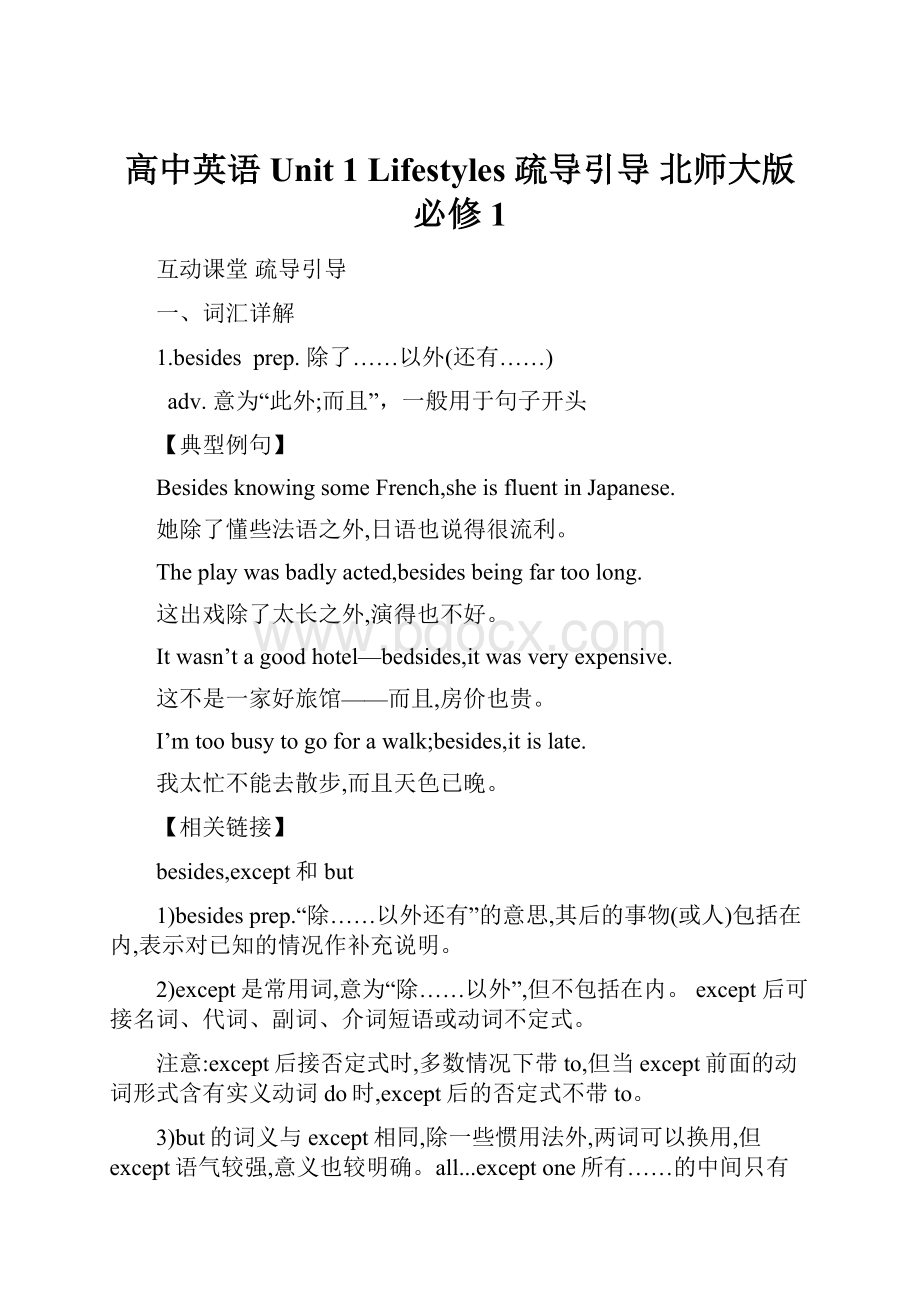高中英语 Unit 1 Lifestyles 疏导引导 北师大版必修1Word格式.docx
《高中英语 Unit 1 Lifestyles 疏导引导 北师大版必修1Word格式.docx》由会员分享,可在线阅读,更多相关《高中英语 Unit 1 Lifestyles 疏导引导 北师大版必修1Word格式.docx(25页珍藏版)》请在冰豆网上搜索。

get为系动词,译为“变得,成为”。
“get+adj.”表示的是动态过程,如getill“患病,得病”。
而“be+adj.”则表示静态,如beill“病了,病着”。
在以下get取代了be的结构中,get均表示从无到有的动态过程:
getpaid发薪
getmarried结婚
getusedto习惯于
gettired累了
getdressed穿好衣服
getangry发怒
getdrunk喝醉
3.reducevt.把……减少;
降低(价格);
缩小(程度、尺寸等)
Shereducedherweightby6kilograms.
她的体重减少了6公斤。
Thebikewasreducedfrom300yuanto200yuan.
这辆自行车的价格从300元降到200元。
Youmustreduceyourexpenses.
你必须减少你的开支。
reduce/increaseto...减少到/增加到……
reduce/increaseby...减少了/增加了……
reduce还可以表示“使成为”“使处于(某种状态)”,多用于被动语态,且与介词to连用。
Thehousewasreducedtoashes.
房子被烧成灰烬。
4.sufferv.受苦;
苦难;
患病;
遭受;
忍受
sufferingn.痛苦;
苦难
She’sbeensufferingfrom(=beenillwith)cancerfortwoyears.
她患癌症两了。
Hesuffersfrom(=isoftenillwith)asthma.
他患有哮喘。
Ifyou’renothappywithit,youshouldcomplain.Don’tjustsufferinsilence(=withoutsayinganything).
如果你不满意,你应该说出来,不要默默地忍受。
Thevillageissufferingfromdepopulation.
那个村庄正为人口减少而苦恼。
Thecitysufferedseriousdamagefromtheearthquake.
那个城市因地震而遭受严重破坏。
suffer用作及物动词时,意为“遭受;
蒙受”,后接pain,defeat,loss,poverty,hunger等名词。
用作不及物动词时,意为“受痛苦”,常用sufferfrom。
5.preventvt.妨碍;
阻碍;
防止;
预防。
后接名词或动名词作宾语。
Rainpreventedthebaseballgame.
下雨使棒球比赛无法举行。
Godpreventsuswithhisgrace.
上帝以其恩惠引领我们。
Nothingwillpreventhermarryinghim.
什么也阻止不了她和他结婚。
疑难辨析
prevent...from.../stop...from/keep...from
三者都可以表示“制止(阻止)”的意思,它们常可以互换使用,介词from后接v.-ing形式。
prevent...from...与stop...from...中的from常可省略。
Theheavyrainprevented/stoppedus(from)comingtothemeetinglastnight.
因为下雨,我们昨晚没来参加会议。
Nothingisevengoingtostopthem(from)talking.
什么也不能阻止他们说话。
Wemustpreventthem(from)makingtrouble.
我们必须阻止他们捣乱。
当这两个结构用于被动语态时,from不能省略。
Wewerepreventedbytheheavyrainfromcominghere.
大雨使我们来不了这儿。
Somethingmustbedonetopreventthebadthingsfromhappeningagain.
一定要采取措施防止这些坏事情再次发生。
另外这两个结构后面还可以跟v.-ing的复合结构,即“物主代词或名词所有格+v.-ing”。
Illnessprevented/stoppedmygoingthere.
我因病没有办法去那儿。
keep...from...中的from任何时候都不能省略。
Nothingcouldkeephimfromdoingthat.
什么事都不能阻止他那样做。
Wemustkeepthemfromgettingtoknowourplans.
我们一定不能让他们知道我们的计划。
比较:
keepsb.doingsth.意为“让某人一直做某事”。
Hekepthissondoingexercisesalltheafternoon.
他让儿子整个下午一直做练习。
6.dependvi.依靠;
依赖;
相信
Thatdependson/uponyourefforts.
那全靠你的努力。
Heisnottobedependedon.
他不足以信赖。
Hisfamilydependsonhimtosupport.
他的家庭靠他维持生计。
Childrendependontheirparentsforfoodandclothing.
孩子靠父母供应衣食。
She’sawomanwhocanbedependedon.
她是一个可以信赖的人。
Whetherhewillgotheredependsonyourdecision.
他是否去那儿取决于你的决定。
1)depend常与on或upon搭配。
2)thatdepends;
it(all)depends看情况而定,单独使用,或置于句首。
3)dependuponit(that)的的确确;
我敢说……;
肯定……
7.controlvt.&
vt.控制;
管理;
抑制
n.[U]管理;
控制;
vt.Can’tyoucontrolthatchild?
你不能管束那孩子吗?
Shecouldn’tcontrolherselfwhensheheardthenews.
她听到那消息后,不能控制自己的感情。
n.Shehasnocontroloverherfeeling.
她抑制不住自己的感情。
1)control的现在分词、过去式和过去分词都要双写l再加ing或ed。
即:
controlling,controlled,controlled。
2)be/getoutofcontrol失去……的控制;
不听约束 losecontrolof失去对……的控制
Thechildrenareoutofcontrol.
孩子们不听管教。
3)beinthecontrolof(sth.)管理;
统治……
Shemaybeold,butshe’sstillinthecontrolofallthatishappening.
虽然纪大了,她却依然控制着局面。
4)undercontrol/underthecontrolof在……控制之下
8.prefervt.(比较)喜欢;
宁愿(选择);
宁可
Whichdoyouprefer,riceorbread?
你比较喜欢哪一样,米饭还是面包?
Hepreferscountrylifetotownlife.
他喜欢乡村生活胜过城市生活。
1)prefertodosth.更喜欢做……
prefernottodosth.宁愿不……
Atthemomenttheyprefernottotalkaboutthisquestion.
在这个时刻,他们宁愿不谈这个问题。
2)表示“更喜欢某人做……”用prefersb.todosth.;
表示“宁愿某人不……”用prefersb.nottodosth.
Ishouldpreferyoutobeinchargeofthisexperiment.
我建议你负责这实验。
Theypreferredhernottogowiththem.
他们宁愿她不跟他们去。
3)表示“更喜欢做……,不喜欢做……”,用prefertodosth.(rather)thandosth.或prefersth./doingsth.tosth./doingsth.
Iprefertowalkratherthan(to)gobybike.
我宁可步行,也不愿意骑自行车。
4)prefer+thatclause用于表达某人的愿望,从句用过去时或(should)do。
Shepreferredthatweshouldhavethediscussionrightaftertheclass.
她更愿意我们一听完课就讨论。
9.addvt.增加;
添加;
补充说 vi.加起来;
添加
Ifyouadd(=calculatethetotalof)threeandfour,yougetseven.
三加四等于七。
She’saddedaPicassotohercollection.
她的收藏品中增加了一幅毕加索的画。
Shewassad,shesaid,butadded(=saidalso)thatshefeltshehadmadetherightdecision.
她说她很难过,但是她接着又说她感到她做出了一项正确的决定。
Weaddedaroomtoourhouse.
我们给房子添盖了一个房间。
“Thankyouforallyourhelp!
”headdedashewasleaving.
在他离开时又补充说:
“谢谢你的所有帮助。
”
1)addup合计;
加起来;
前后一致
Addupyourscoreandseehowmanypointsyoucanget.
将你所得的分数加起来,看看能得多少分。
Whathesaysdoesnotaddup.
他说的话前后不一致。
2)addto增加
Hercolleagues’laughteronlyaddedto(=increased)herembarrassment.
同事们的嘲笑使她更加窘迫。
3)add...to...加……;
往……添加……
Willyouaddmoresugartoyourcoffee?
你的咖啡要多加些糖吗?
4)addupto总共有;
总计达
Hiswholeschooleducationaddeduptonomorethanoneyear.
他所受的全部学校教育加起来不过一。
10.reasonn.原因;
理由;
解释;
道理;
情理
v.推理;
推论;
推断
n.Makealistofreasonswhyfriendsareimportanttoyou.
列出朋友对你重要的理由。
Wehavenoreasontobelievehim.
我们没理由相信他。
Theseareourreasonsfordoingit.
这些就是我们做这件事的理由。
Thereasonwhywewerelateisthatourcardidn’tcome.
我们迟到的原因是车没来。
v.Shereasonedthatshemusthaveleftherbagonthetrain.
她断定准是把包落在火车上了。
Ispenthoursreasoningoutthesolutiontothepuzzle.
我花了好几个小时才想出这个谜的谜底。
1)reason用作名词,作“理由;
原因”解时,常接:
(1)+todo
(2)+for短语 (3)+why从句,表示“……的理由/原因”。
2)汉语中的“原因是因为……”英语中常用“Thereasonisthat...”来表达,口语中也可用“Thereasonisbecause...”。
同义词辨析
reason,cause,excuse
1)reason指产生某种行为或想法的推理上的理由,与conclusion相对。
reasonfor表示“……的理由”。
2)cause主要指导致某种结果、客观存在的原因,它是相对于effect来说的。
causeof表示“……的起因”。
3)excuse多指为免受指责或推卸责任而找的“理由、借口”。
11.beusedto后跟名词、代词、动名词(v.-ing)时常译作“习惯于……;
惯常于……”(be可用get、become替代)
Heisquiteusedtohardwork.
他习惯于艰苦的工作。
Heisusedtowalkingintheparkaftersuppereveryday.
每天晚饭后,他习惯去公园散步。
Heisusedtogettingupearly.
他习惯早起。
1)beusedto+n./pron./v.-ing
“习惯于做……”,可用于各种时态
2)usedtodo过去常常做某事(现在不做)
强调过去的习惯性行为,只用于过去时态。
Heusedtogotoschoolbybike.
他过去常常骑自行车上学。
Heusedtoswiminapoolnearhishomewhenhewasachild.
小时候他常去他家附近的池塘游泳。
3)beusedtodo...被用来做……
不定式表示目的,可用于多种时态。
Woodcanbeusedtomakepaper.
木头能够被用来造纸。
Thiskindofnaturalplantcanbeusedtomakemedicine.
这种天然植物可以被用来制药。
12.mindn.思维;
头脑;
想法;
记忆;
(智力发达)的人v.注意;
留心;
当心
n.Suddenlyagoodideacameintomymind.
突然我想起了一个好注意。
Youshouldkeepallthenewwordsinmind.
你应该把所有的新单词都记住。
Thesewerealotofmindsinhistory,whodidalotofcontributiontothesociety.
在历史上有很多头脑聪明的人,他们为人类社会作出了巨大的贡献。
v.Mindthatyoudon’tforgettomailtheletters.
注意可别忘了寄信。
Mindyourheadwhenyouenterthedoor.
当你进门的时候留心别碰头。
Wouldyoumindmysmokinghere?
你介意我在这儿吸烟吗?
1)keep...inmind牢记……
2)mindone’sdoing...(常用于疑问句、否定句、条件句中)介意、反对。
3)Wouldyouminddoing也可以替换为Wouldyoumindif...句型。
这些句型用来表示请求对方的许可。
4)回答带有mind的问句时要注意yes或no都是针对mind选用的,表示“介意;
在乎”时选用yes,后面跟句子,意思为不让对方做某事;
表示“不介意,不在乎”时,选用no,后面跟句子,意思是允许对方做某事。
giveone’smindto...专心于……
haveamindtodo...很想做……
toone’smind根据某人意见
13.preparevt.&
vi.准备;
预备
preparationn.准备
Theywerequitepreparedtobefriendly.
他们是有意亲睦的。
Theyarepreparingabookshow.
他们正在准备一本书的展览。
1)prepare...for/todosth.使某人为……做好准备
2)bepreparedfor/todosth.为……做好准备
3)preparetodosth.准备做…… 例如:
Thestudentsaretryingtopreparethelessonsforthefinalexam.
学生们正在为期末考试做准备。
Canyouhelpmepreparetoholdthisparty?
你能帮我准备举行这场晚会吗?
makepreparationsfor...为……作准备
疑难辨析:
prepare和preparefor
prepare准备,谓语动词动作直接体现在宾语上。
preparefor...为……作准备,for的宾语一般只是谓语动作要达到的目的。
14.determinedadj.坚决的;
有决心的
Shegavemeadeterminedlook.
她给了我一个坚定的眼神。
Sheisaverydeterminedyoungwoman.
她是一个意志坚定的轻女士。
“决定做某事”的表达:
bedeterminedtodosth.
bedeterminedthat从句
=makeupone’smindtodosth.
Wearedeterminedtoworkhardatourlessons.
我们决心努力学习功课。
1)determinevt.&
vi.决定;
决心
determinetodosth.=decidetodosth.决定做某事
determine+n.决定某事
determine+clause决定……
determineon/upon决定……
2)determinationn.决心
withdetermination下决心
15.crowdedadj.拥挤的(若表示“某处挤满了……”,常用短语:
...becrowdedby/with...)
Thehalliscrowdedwiththepersonstakingpartintheparty.
整个大厅都被来参加会议的人挤满了。
Thismorning,thegroundiscrowdedwiththewhitesnow.
今天早晨,地上白雪皑皑。
crowded可用作名词或动词,译作“人群、大众、成群”,在句中作主语时,谓语动词可按单数或复数对待,thecrowd“老百姓,大众”。
Therewerecrowdsofpeopleatthetheatre.
剧院里挤满了人。
Thecrowdwas/weremarchingonthestreettoimprovetheirlivingconditions.
老百姓为改善生活条件正在大街上游行。
用作动词时,可译作“挤满”或“聚集”。
Shopperscrowdedthedepartmentstore.
顾客挤满了商店。
Thestudentscrowdedroundtheteachertoaskquestions.
学生围在老师周围请教问题。
16.attendvt.出席;
参加;
照顾;
护理
vi.注意;
专心
Everyonem